Homegrown hospitality

May/June 2022 California Bountiful magazine
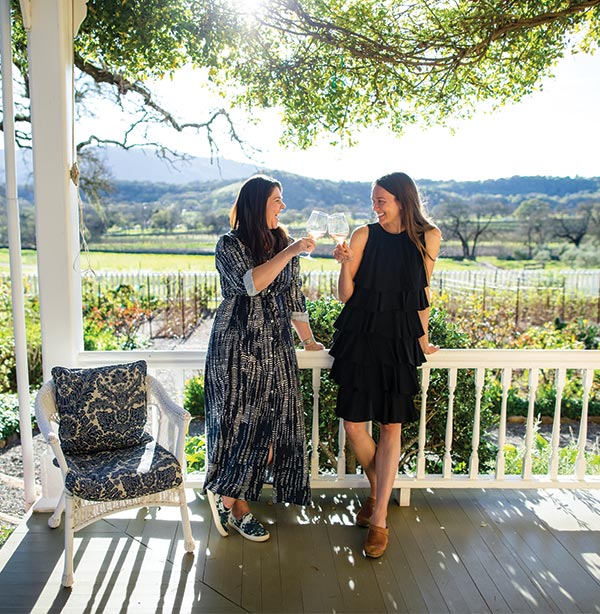
Family extends warm welcome
to guests at historic farm stay inn
Story by Christine Souza
Photos by Paige Green
Visitors to picturesque Beltane Ranch in Glen Ellen can relax under majestic oak trees with a glass of wine originating from a nearby vineyard, enjoy a chef-prepared picnic of farm-grown produce or hop into a 4x4 for a tour with views including chickens foraging in the orchards.
Such is the 130-year legacy of hospitality being extended to guests at the historic Sonoma County ranch.
"My family has been on this property since 1936," said Lauren Benward, whose children represent her family's sixth generation on the land. "We have this beautiful main house that was built as hospitality accommodations back in 1892. So, taking care of people and hosting people in a farm and ranch setting is natural for the property, and it's how we've grown up."
Mary Ellen Pleasant, the daughter of slaves who rose to financial and political power as an entrepreneur and abolitionist, was one of the ranch's first owners and constructed the New Orleans-style house that now serves as the farm stay's inn. In the 1960s, Benward's grandmother restored Pleasant's house one room at a time, furnishing guest rooms with historically significant furniture—including a dressing table from Pleasant's own collection.
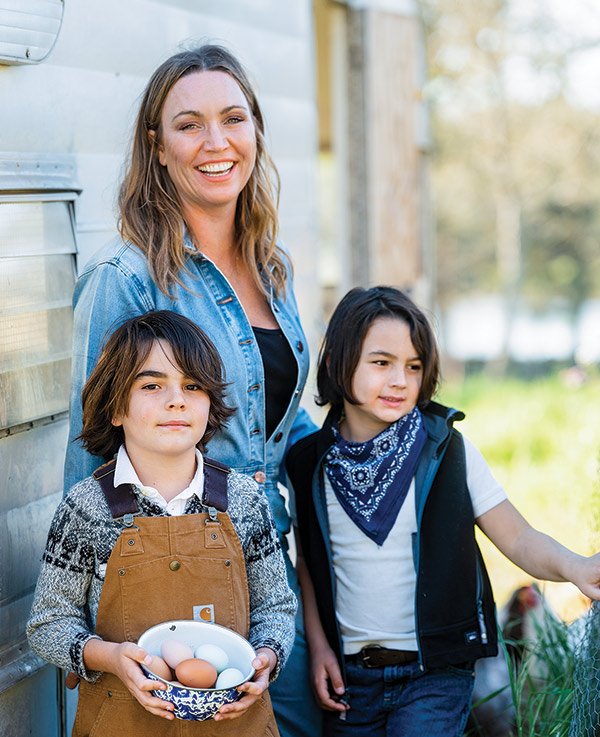
"I worked with my grandmother, worked with my mom—and it's the people that come and stay and want these experiences that keep us going," Benward said.
Guests from around the world are drawn to the family-run ranch, which is a 105-acre agricultural preserve and working farm of estate vineyards, olive orchards, gardens and fruit trees. It is also home to sheep, burros, chickens and guardian dogs.
"We live really kind of hectic and connected lives and sometimes silencing that and just enjoying some open space or connecting with animals and plants really feels right," Benward said.
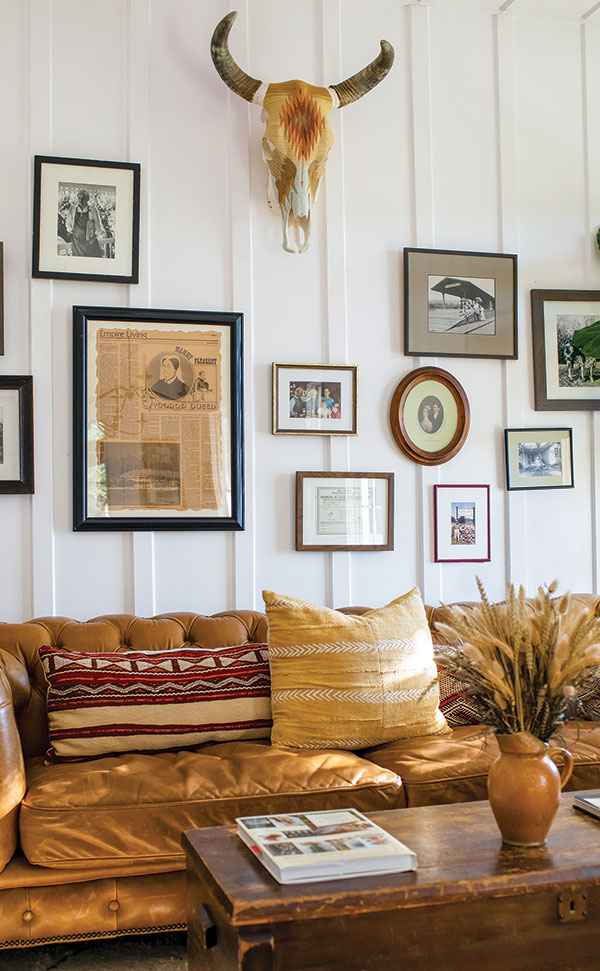
A slice of rural life
Beltane Ranch is one of hundreds of sites throughout California where farm and ranch owners welcome guests seeking an opportunity to experience a slice of rural life. Agritourism, as it's called, encompasses a range of activities from horseback riding, pumpkin patches and wine trails to corn mazes, U-pick orchards and farm stays such as Beltane Ranch.
A repeat visitor, Morgan Dewey said she and her family stay there frequently after having identified it as a perfect venue for her wedding in 2010.
"The family is so lovely and warm and they clearly are passionate about the history of the place and preserving it and making it sustainable," the San Francisco resident said. "I appreciate their warmth and hospitality. It is just one of our favorite places in the world."
A member of Beltane Ranch's wine club, Dewey said she returns to the ranch for special events, to celebrate anniversaries or to dine and drink a great glass of wine.
"The property is incredible. I just don't know of anything else like it in the area," Dewey said, adding that the hosts consider the needs of all guests—including the youngest.
"They're really sweet with the kids," she said. "They have a junior rancher map that shows where to walk around the property: Here's where the sheep are and here's where the carrots are that you can feed to the horses."
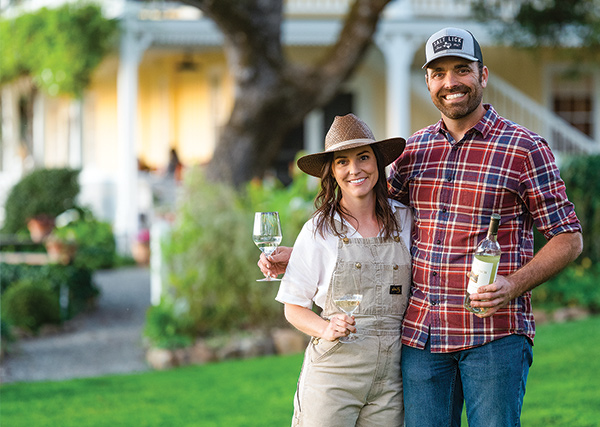
Behind the scenes
"Presenting an experience to people that wows the guests" is one of the family's goals, according to Lauren Benward's brother, Alex. He oversees the general farming operations at Beltane Ranch, while his partner, Kelly Koeberer, manages livestock and horticulture.
"Sharing what we do and seeing it click is just amazing," he said. "To see people learn and get excited and be like, 'I didn't know this is how asparagus grows' is great."
Koeberer pointed out that guests can simply relax at the ranch or pursue a more immersive experience.
"They can walk through the vineyard and visit the sheep. Or they might pick raspberries or jump in and help," she said. Some visitors prefer to get hands-on, but "others just want to see it, be near it and walk the space. It certainly is rewarding for whatever experience people are looking for, even if it's just watching the chickens."
During ranch tours, Koeberer explains the ranch's regenerative farming practices, which involve using livestock to naturally control weeds and pests and to provide nutrients that enrich the soil and promote biodiversity.
"It's a whole cycle," she said. "It's being in harmony with nature but producing and making a living farming."
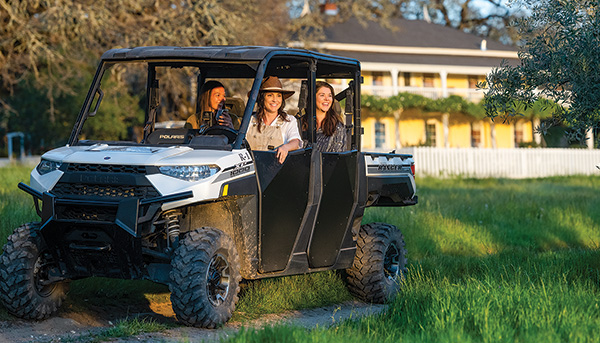
Toasts and tastes
Enjoying a glass of the family's estate wines while walking the vineyard and talking to the family about viticulture is a popular activity for adult guests. After generations of growing grapes for Napa and Sonoma vintners, the family began shipping Beltane Ranch estate wines from its heritage estate vineyard in 2009. The next year, it released its first private-label estate wine, a 2009 sauvignon blanc. The family has since added four more labels: another sauvignon blanc, two rosés and a zinfandel.
Beltane Ranch hosts wine tastings and occasional four-course dinners with wine pairings, and also offers picnics for visitors.
Nearly everything on the menu, including bread and desserts, is made from scratch.
"We make our own vinegar, press our own olive oil. We even have bees on the property for our own honey," said Beltane Ranch Estate Chef Kimberley Cosway.
At times when fruits and vegetables are plentiful, guests can take produce home and Cosway makes preserves and jams.
"Through the summer and fall, we try to preserve as much as possible … which allows us to continue to serve some ranch-grown items through the winter," the chef said.
Nothing is wasted. Whatever is not served to guests is fed to livestock or converted to compost.
During visits, guests learn about these and other realities of farm life, including overcoming challenges such as pandemic-related closures and the 2017 Nuns Fire.
"The property was in the path of the Nuns Fire, fueled by 80-mph winds that ultimately only burned small outbuildings on the ranch, but spared the main house, thanks to help from neighbors," Alex Benward said. "Rebuilding the property into a functioning business took some time."
After taking care of guests and running the farm and vineyard, the family earns some time to relax.
"During the day, we're just thinking about chores and what needs to be done but when we get to sit down around the fire pit and enjoy the sunset, have a glass of wine, it's refreshing," he said. "It's pretty nice."
Regenerative agriculture:
What it is and why it matters
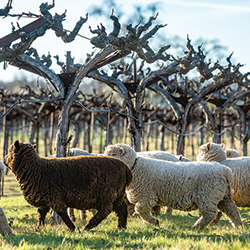
Kelly Koeberer, Beltane Ranch manager of livestock and horticulture, said guests at the Sonoma County farm stay are interested in learning about the ranch's regenerative farming practices. Although the definition is evolving, regenerative farming typically refers to a holistic farming approach that includes livestock grazing for weed control and a source of nutrients, cover crops to attract beneficial insects, and no chemical use.
"Guests learn that this is a really incredible, unique way to farm for the wine that they're drinking," Koeberer said. "Guests go into the vineyard and learn about what the sheep do and of course it's the adorable factor, but look at the grasses and vines, how they're thriving."
Grazing sheep are rotated for weed control in the vineyard and to create defensible space to help prevent wildfires. Chickens peck the ground under the olive trees, digging down to bare ground, while also providing the trees with nutrients.
"Sheep bring nitrogen, which is really important for the soil and especially important to the grapes," Koeberer said. "Sheep are really gentle, but they're also cultivating with their little hooves. They get the grasses down to the most perfect (length). It looks like you took a lawn mower to it."
She expresses gratitude for the opportunity to help guests understand the value of regenerative farming.
"It just makes me smile every day, knowing that we're stewarding this land beautifully and sharing it and hopefully inspiring people," Koeberer said.

